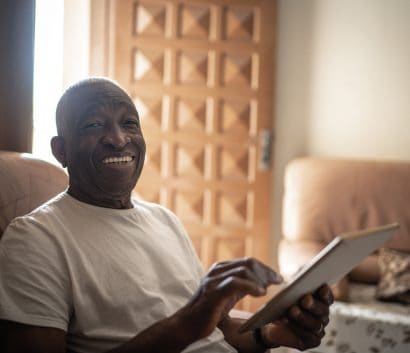HOBSCOTCH: Home-Based Self-Management and Cognitive Training Changes Lives

pdf icon[PDF – 3 MB]
Public Health Challenge
People with epilepsy commonly have problems with cognitive functions such as learning, concentration, and memory. These problems can occur for a variety of reasons, including the underlying cause of a person’s epilepsy, brain abnormalities, recurrent seizures, side effects of antiseizure medicines, or any combination of these.
Not all people living with epilepsy have memory problems, but for those who do, these problems can diminish their quality of life. And people who have trouble with their memory often report feeling anxious about their symptoms, which can increase their stress and make their memory problems worse.
Cognitive problems affect everyday life
Some people with epilepsy have trouble remembering conversations or the names and faces of people they know, which can worsen feelings of social isolation. For others, memory problems make it harder to manage their disease. For example, they may forget to take their medicine, go to a doctor’s appointment, or perform their job duties.
For years, Dr. Barbara Jobst had seen patient after patient with memory problems in her clinic at the Dartmouth-Hitchcock Epilepsy Center at Dartmouth-Hitchcock Medical Center. “We could control their seizures, but they would continue to have problems with memory and concentration that were very limiting to their quality of life,” recalls Dr. Jobst, a leading epilepsy researcher and the chair of the Department of Neurology at Dartmouth’s Geisel School of Medicine.
Memory training can help
Determined to help her patients, Dr. Jobst turned to colleagues at Dartmouth who had studied chemotherapy-related cognitive impairment in patients with cancer. One of those researchers, Dr. Robert Ferguson, had created a cognitive-behavioral therapy program, called Memory and Attention Adaptation Training (MAAT), to help cancer patients regain cognitive function.
After studying MAAT’s impact on cancer patients, Jobst and her trainee Dr. Tracie Caller set about adapting the program for patients with epilepsy. With funding from the Centers for Disease Control and Prevention’s Managing Epilepsy Well Network, they assembled a multidisciplinary working group at Dartmouth-Hitchcock to develop a new program tailored to the patients with epilepsy. They called it HOBSCOTCH: Home-Based Self-Management and Cognitive Training Changes Lives.
Approach

HOBSCOTCH is a behavioral program that helps adults with epilepsy who have self-identified memory or thinking problems.
The program is divided into eight sessions lasting about 45 minutes to 1 hour. Participants are guided through each session by a certified “Cognitive Coach,” typically a licensed health care provider with experience in one-on-one counseling. They are assigned “homework” in the form of applying skills learned each week to their everyday life.
Focus on problem solving helps patients adapt
“Organization skills, disease management skills, social skills can all be impacted by memory challenges—it just depends on the person,” says Dr. Elaine Kiriakopoulos, an assistant professor of neurology at Dartmouth and director of the HOBSCOTCH Institute for Health and Well-being. “Each person comes to the program with their own set of challenges and their own goals. Our HOBSCOTCH coaches provide the support and skills training to help people tackle those challenges.”
HOBSCOTCH has four components:
• Education about epilepsy, memory and attention
problems, and the factors that influence them.
• Training in self-awareness and relaxation.
• Training in the application of memory strategies.
• Problem-solving therapy.
“Problem-solving therapy is a major component of the program,” says Kiriakopoulos. “It gives people skills to systematically work through any cognitive-related difficulties they have so that they can better approach day-to-day problems.”

‘Memory toolbox’ offers practical strategies
That could mean remembering names, keeping a schedule of appointments, using reminders to take medicine on time, or finding ways to limit distractions at work or in social settings. Patients who participate in HOBSCOTCH are also given a “memory toolbox” with helpful strategies for setting up reminders.
“For example, one sticky note on your fridge can be helpful as a reminder to follow through on a task,” says Kiriakopoulos. “But a dozen sticky notes can become overwhelming and defeats the purpose.”
Another popular component of the program is the instruction in mindfulness. “The program teaches progressive muscle relaxation and deep breathing exercises that patients learn to use daily and as needed,” says Kiriakopoulos, “during a stressful situation at work or in a classroom or in a social setting.”
Results
In 2016, Jobst and her colleagues conducted a randomized clinical trial of HOBSCOTCH. They found that the Dartmouth program greatly improved quality of life and cognition in adults with epilepsy. Study participants who did not receive HOBSCOTCH showed a decline in quality of life. The Dartmouth team then studied HOBSCOTCH in a larger population, enrolling adults with epilepsy and cognitive problems at four centers in northern New England.
That study found the same results—“a significant impact on both quality of life and memory perception,” says Kiriakopoulos. “It was exciting to see the benefits of the program replicated across different epilepsy centers.”
Smartphone app now available
In 2019, Jobst and her colleagues partnered with the Emory University Prevention Research Center to evaluate HOBSCOTCH in a new group of patients in New England as well as patients across the United States. The trial, HOBSCOTCH-3, is also evaluating a new HOBSCOTCH smartphone app. “The app makes it easier for people to track how they are doing with their seizures, medicine, and memory skills,” says Kiriakopoulos. “It also provides a place for patients to journal and store any additional information that they feel important to share with their doctor at their next visit”
With the growing evidence base for and interest in HOBSCOTCH, Jobst and Kiriakopoulos founded the HOBSCOTCH Institute at Dartmouth in June 2020. Their goal was to improve access to care for people with cognitive problems and epilepsy, educate professionals and the public, and conduct rigorous research that translates knowledge into better health outcomes and quality of life. The Institute team is made up of psychologists, nurses, social workers, statisticians, computer scientists, physicians, and
public health professionals.
“Through the HOBSCOTCH Institute, we’ve really grown the number of certified coaches—there are currently more than 140 in the U.S. and Canada—the number of people who are benefitting from HOBSCOTCH, and the number of groups that are now implementing it,” says Kiriakopoulos.
Effect on veterans, caregivers being studied
In 2021, the US Department of Defense funded the HOBSCOTCH Institute to study the program’s impact on patients with post-traumatic epilepsy. “Brain injury and epilepsy all too often go hand-in-hand,” says Kiriakopoulos. “So, we’re working purposefully with 12 collaborators from different epilepsy centers, Veterans Affairs hospitals, and community organizations that serve veterans and civilians to see if this is a patient population we can help with HOBSCOTCH.”
This study will also be the first to evaluate the program’s effect on caregivers. “It can be very stressful to care for someone with unpredictable seizures and difficulty with their thinking and memory,” says Kiriakopoulos. “We are hopeful that HOBSCOTCH can help to alleviate some of that burden and help to improve quality of life for caregivers.”

What’s Next
The Dartmouth team and their colleagues at Emory and the Department of Defense are eagerly looking forward to the results of their research. The studies will continue through at least 2024. Meanwhile, the Dartmouth team plans to bring greater awareness to HOBSCOTCH, including its capacity for being entirely delivered via telehealth.
“We want to spread the word that while HOBSCOTCH began as an in-person program, it can now be done anywhere, and we will be working over the next year to reach new patient populations by adapting our program to benefit youth and Hispanic-speaking populations living with epilepsy and cognitive challenges,” says Kiriakopoulos. She and colleagues are also planning to host a blog on the HOBSCOTCH Institute website aimed at building a HOBSCOTCH community.
“We want to hear from participants, from coaches, from doctors who take care of people with epilepsy, and from researchers who want to study it,” she says. “The idea is to connect everyone to improve outcomes and quality of life for people with epilepsy.”

Trina Dawson, BA
Program Coordinator, Department of Neurology HOBSCOTCH Institute for Cognitive health and Well-Being
Dartmouth Hitchcock Epilepsy Center
1 Medical Center Drive, Lebanon, NH 03756
Email: MEWprograms@hitchcock.org
Phone: 603-650-8165
Fax: 603-653-9949
Elaine Kiriakopoulos, MD, MSc
Assistant Professor of Neurology, Geisel School of Medicine at Dartmouth College
Director, HOBSCOTCH Institute for Cognitive Health & Well-Being
Dartmouth-Hitchcock Epilepsy Center
Managing Epilepsy Well Coordinating Center at Dartmouth
1 Medical Center Drive, Lebanon, NH 03756
Email: Elaine.T.Kiriakopoulos@dartmouth.edu
Phone: 603-306-1538
Find Out More
This project is supported by the Centers for Disease Control and Prevention through Cooperative Agreement CDC-RFA- U48DP005018, administered by CDC’s Division of Population Health.
To learn more, visit: Managing Epilepsy Well HOBSCOTCHexternal icon